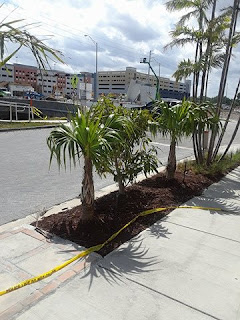On March 15th, 2018 the
pedestrian bridge over the FIU (Florida International University) in Miami collapsed during the process of post-tension rod adjustment when it suddenly
failed and unfortunately and several occupied vehicles were crushed underneath,
and six deaths and nine injuries have been reported. They were innocent victims
that we should regret. I visited the site two days later and at the time the
crews were proceeding to extract cars with victims inside and the photograph
above was the closest I could get. The $14.2 million project was funded with a
$19.4 million TIGER grant from the United States Department of Transportation
in 2013, along with state agencies. The bridge itself cost $9 million to
construct. The section of the bridge that collapsed weighed 950 short tons and
fell onto the vehicles on the roadway
There are many theories about the
main reasons that caused this tragedy and a lot of speculation about whether materials
testing were performed on site or the quality of the materials, violation of
safety rules and possible fraud. Also, the Florida Department of Transportation
ordered the northern support pylon be moved 11 feet to make room for future
expansion of the trail. That required a design change that lengthened the span –
and put the support pylon in the dirt well off the edge of the roadway, which
could also explain why the northernmost truck could no longer follow its
original planned route.
The main span was rolled into place
and set on support columns on March 10, five days before the collapse. The
canal span, access ramps, and faux cable- stay tower had not been built. Post
tensioning of a diagonal member may be one of the reasons for the structural
failure of the bridge. Concrete is much more prone to crack than steel in
trusses. Certain cracks could be the cause of the failure when the
post-tensioning operation began.
Doctor Henry Petroski, Professor of
civil engineering and history at Duke
University
“Once a
design is completed, subsequent modifications tend to be suggested and approved
without the full care that went into the original design. This has happened
time and again in bridges and other engineering structures.”
It must be considered that the
bridge collapsed only 5 days after its installation and that the company previously
had been sanctioned for various reasons. One of the points that I consider
necessary to mention is that one of the engineers tried to communicate and
received a response 3 days later. It is important for any management to answer
emails, message calls and any communication as soon as possible. At the end, helps
to improve our professional image and to prevent fatal consequences like this
one, where innocent human victims paid the toll. Innovation is a long process
and we can not skip any step. The Florida
International University
Neil Hawkings, an emeritus engineering
professor at the University
of Illinois
“The question is, to what extent had
the new concepts in this been validated through testing prior to actually
putting it in place?”
Engineers over the world have been
obsessively dissecting photos, videos trying to search the mysterious and
elusive breaking point but nothing close to a conclusive explanation.
References:
Two weeks
ago, FIU’s bridge abruptly collapsed. Here’s what we know so far:
FIU Bridge
Collapse in slow motion. Time: 0:40:
Miami
Bridge- Failure-preliminary analysis 17 march 2018. Time: 10:14:
Simply
Explained Bridge Collapse I Engineering and Construction. Time: 11:59:
Why the Miami
FIU Florida
Bridge Collapse NO CRACK with Great close ups of the north end of Bridge before
video. Time: 17:19:
Experts
dissect Miami
https://www.youtube.com/watch?v=FxuqXHVZ0mU



Today is July 12, 2018 and still we don't have any update of the investigation.
ReplyDelete